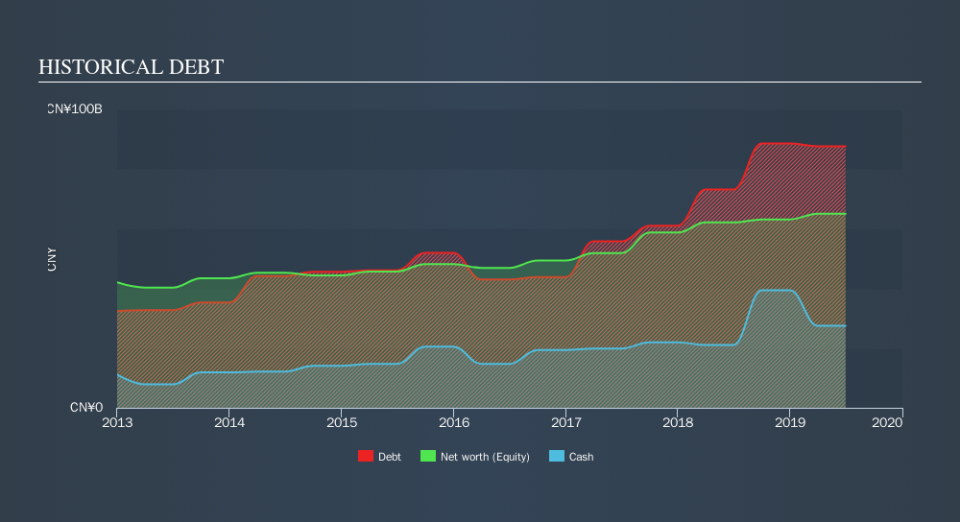Here's Why Sino-Ocean Group Holding (HKG:3377) Has A Meaningful Debt Burden

Howard Marks put it nicely when he said that, rather than worrying about share price volatility, 'The possibility of permanent loss is the risk I worry about... and every practical investor I know worries about. So it might be obvious that you need to consider debt, when you think about how risky any given stock is, because too much debt can sink a company. As with many other companies Sino-Ocean Group Holding Limited (HKG:3377) makes use of debt. But is this debt a concern to shareholders?
Why Does Debt Bring Risk?
Generally speaking, debt only becomes a real problem when a company can't easily pay it off, either by raising capital or with its own cash flow. If things get really bad, the lenders can take control of the business. While that is not too common, we often do see indebted companies permanently diluting shareholders because lenders force them to raise capital at a distressed price. Having said that, the most common situation is where a company manages its debt reasonably well - and to its own advantage. When we think about a company's use of debt, we first look at cash and debt together.
Check out our latest analysis for Sino-Ocean Group Holding
What Is Sino-Ocean Group Holding's Net Debt?
As you can see below, at the end of June 2019, Sino-Ocean Group Holding had CN¥87.6b of debt, up from CN¥73.1b a year ago. Click the image for more detail. However, it also had CN¥27.5b in cash, and so its net debt is CN¥60.2b.
How Strong Is Sino-Ocean Group Holding's Balance Sheet?
According to the last reported balance sheet, Sino-Ocean Group Holding had liabilities of CN¥110.8b due within 12 months, and liabilities of CN¥79.8b due beyond 12 months. Offsetting these obligations, it had cash of CN¥27.5b as well as receivables valued at CN¥65.3b due within 12 months. So its liabilities outweigh the sum of its cash and (near-term) receivables by CN¥97.7b.
This deficit casts a shadow over the CN¥19.8b company, like a colossus towering over mere mortals. So we'd watch its balance sheet closely, without a doubt After all, Sino-Ocean Group Holding would likely require a major re-capitalisation if it had to pay its creditors today.
In order to size up a company's debt relative to its earnings, we calculate its net debt divided by its earnings before interest, tax, depreciation, and amortization (EBITDA) and its earnings before interest and tax (EBIT) divided by its interest expense (its interest cover). This way, we consider both the absolute quantum of the debt, as well as the interest rates paid on it.
Strangely Sino-Ocean Group Holding has a sky high EBITDA ratio of 13.6, implying high debt, but a strong interest coverage of 1k. This means that unless the company has access to very cheap debt, that interest expense will likely grow in the future. Importantly, Sino-Ocean Group Holding's EBIT fell a jaw-dropping 49% in the last twelve months. If that decline continues then paying off debt will be harder than selling foie gras at a vegan convention. The balance sheet is clearly the area to focus on when you are analysing debt. But it is future earnings, more than anything, that will determine Sino-Ocean Group Holding's ability to maintain a healthy balance sheet going forward. So if you want to see what the professionals think, you might find this free report on analyst profit forecasts to be interesting.
But our final consideration is also important, because a company cannot pay debt with paper profits; it needs cold hard cash. So we always check how much of that EBIT is translated into free cash flow. Over the most recent three years, Sino-Ocean Group Holding recorded free cash flow worth 63% of its EBIT, which is around normal, given free cash flow excludes interest and tax. This cold hard cash means it can reduce its debt when it wants to.
Our View
To be frank both Sino-Ocean Group Holding's EBIT growth rate and its track record of staying on top of its total liabilities make us rather uncomfortable with its debt levels. But on the bright side, its interest cover is a good sign, and makes us more optimistic. Overall, it seems to us that Sino-Ocean Group Holding's balance sheet is really quite a risk to the business. For this reason we're pretty cautious about the stock, and we think shareholders should keep a close eye on its liquidity. Another positive for shareholders is that it pays dividends. So if you like receiving those dividend payments, check Sino-Ocean Group Holding's dividend history, without delay!
When all is said and done, sometimes its easier to focus on companies that don't even need debt. Readers can access a list of growth stocks with zero net debt 100% free, right now.
We aim to bring you long-term focused research analysis driven by fundamental data. Note that our analysis may not factor in the latest price-sensitive company announcements or qualitative material.
If you spot an error that warrants correction, please contact the editor at editorial-team@simplywallst.com. This article by Simply Wall St is general in nature. It does not constitute a recommendation to buy or sell any stock, and does not take account of your objectives, or your financial situation. Simply Wall St has no position in the stocks mentioned. Thank you for reading.

